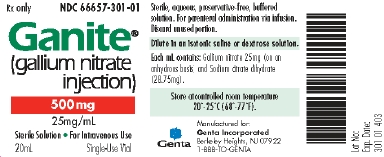FDA records indicate that there are no current recalls for this drug.
Are you a medical professional?
Trending Topics
Ganite Recall
Get an alert when a recall is issued.
Questions & Answers
Side Effects & Adverse Reactions
(See boxed WARNING.) The hypercalcemic state in cancer patients is commonly associated with impaired renal function. Abnormalities in renal function (elevated BUN and/or serum creatinine) have been observed in clinical trials with Ganite. It is strongly recommended that serum creatinine be monitored during Ganite therapy. Since patients with cancer-related hypercalcemia are frequently dehydrated, it is important that such patients be adequately hydrated with oral and/or intravenous fluids (preferably saline) and that a satisfactory urine output (a urine output of 2 L/day is recommended) be established before therapy with Ganite is started. Adequate hydration should be maintained throughout the treatment period, with careful attention to avoid overhydration in patients with compromised cardiovascular status. Diuretic therapy should not be employed prior to correction of hypovolemia. Ganite therapy should be discontinued if the serum creatinine level exceeds 2.5 mg/dL.
The use of Ganite in patients with marked renal insufficiency (serum creatinine > 2.5 mg/dL) has not been systematically examined. If therapy is undertaken in patients with moderately impaired renal function (serum creatinine 2.0 to 2.5 mg/dL), frequent monitoring of the patient’s renal status is recommended. Treatment should be discontinued if the serum creatinine level exceeds 2.5 mg/dL.
Combined use of Ganite with other potentially nephrotoxic drugs (e.g., aminoglycosides, amphotericin B) may increase the risk of developing renal insufficiency in patients with cancer-related hypercalcemia (see boxed WARNING).
Legal Issues
There is currently no legal information available for this drug.
FDA Safety Alerts
There are currently no FDA safety alerts available for this drug.
Manufacturer Warnings
There is currently no manufacturer warning information available for this drug.
FDA Labeling Changes
There are currently no FDA labeling changes available for this drug.
Uses
Ganite is indicated for the treatment of clearly symptomatic cancer-related hypercalcemia that has not responded to adequate hydration. In general, patients with a serum calcium (corrected for albumin) < 12 mg/dL would not be expected to be symptomatic. Mild or asymptomatic hypercalcemia may be treated with conservative measures (i.e., saline hydration, with or without diuretics). In the treatment of cancer-related hypercalcemia, it is important first to establish adequate hydration, preferably with intravenous saline, in order to increase the renal excretion of calcium and correct dehydration caused by hypercalcemia.
History
There is currently no drug history available for this drug.
Other Information
Gallium nitrate injection is a clear, colorless, odorless, sterile solution of gallium nitrate, a hydrated nitrate salt of the group IIIa element, gallium. Gallium nitrate is formed by the reaction of elemental gallium with nitric acid, followed by crystallization of the drug from the solution. The stable, nonahydrate, Ga(N03)3•9H2O is a white, slightly hygroscopic, crystalline powder of molecular weight 417.87, that is readily soluble in water. Each mL of Ganite (gallium nitrate injection) contains gallium nitrate 25 mg (on an anhydrous basis) and sodium citrate dihydrate 28.75 mg. The solution may contain sodium hydroxide or hydrochloric acid for pH adjustment to 6.0-7.0.
Sources
Ganite Manufacturers
-
Genta Incorporated
![Ganite (Gallium Nitrate) Injection, Solution, Concentrate [Genta Incorporated]](/wp-content/themes/bootstrap/assets/img/loading2.gif)
Ganite | Genta Incorporated
![Ganite (Gallium Nitrate) Injection, Solution, Concentrate [Genta Incorporated] Ganite (Gallium Nitrate) Injection, Solution, Concentrate [Genta Incorporated]](/wp-content/themes/bootstrap/assets/img/loading2.gif)
The usual recommended dose of Ganite is 200 mg per square meter of body surface area (200 mg/m2) daily for 5 consecutive days. In patients with mild hypercalcemia and few symptoms, a lower dosage of 100 mg/m2/day for 5 days may be considered. If serum calcium levels are lowered into the normal range in less than 5 days, treatment may be discontinued early. The daily dose must be administered as an intravenous infusion over 24 hours. The daily dose should be diluted, preferably in 1,000 mL of 0.9% Sodium Chloride Injection USP, or 5% Dextrose Injection USP, for administration as an intravenous infusion over 24 hours. Adequate hydration must be maintained throughout the treatment period, with careful attention to avoid overhydration in patients with compromised cardiovascular status. Controlled studies have not been undertaken to evaluate the safety and effectiveness of retreatment with gallium nitrate.
When Ganite is added to either 0.9% Sodium Chloride Injection USP or 5% Dextrose Injection USP, it is stable for 48 hours at room temperature (15°C to 30°C) or for 7 days if stored under refrigeration (2°C to 8°C). Parenteral drug products should be inspected visually for particulate matter and discoloration prior to administration whenever solution and container permit.
Login To Your Free Account


